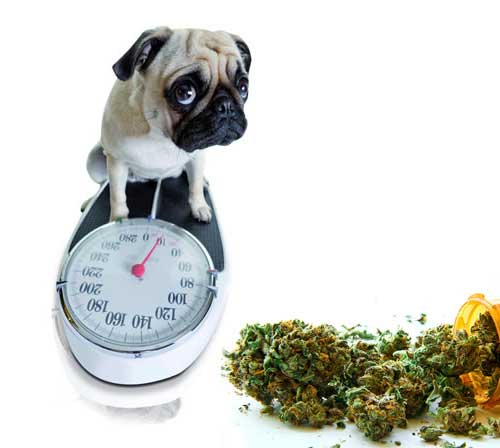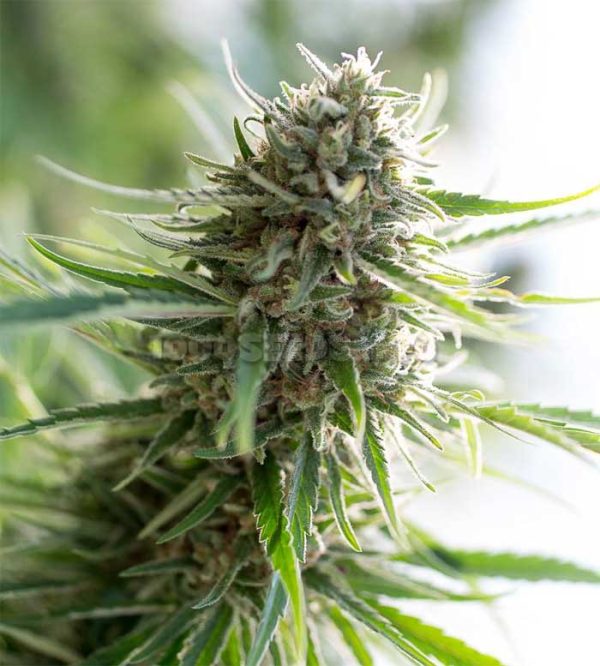The feeling of an incredibly strong appetite and cravings after consuming cannabis has been documented for hundreds of years and is something that every cannabis user knows. The feeling is often referred to as a "munchies", or "munchies" in the USA. This appetite stimulating effect can be of great importance for many patients with eating disorders or cancer and help to alleviate the symptoms as numerous studies have shown.
Cannabinoids have a medically relevant influence on their user through interactions with specific receptors in the body.
A review was published in Clinical Neuroscience July-August 2014 examining the available research and information on the effects of cannabis use on body weight. We will briefly summarise the results below:
The use of cannabis can stimulate the appetite and lead to cravings, as described above. In studies on the effect of cannabis use in patients suffering from cachexia (unwanted weight loss, muscle weakness, fatigue, loss of appetite) and anorexia, HIV, it was shown that marijuana use does not directly increase body weight. Rather, the use of cannabis increases the appetite, thus enabling an increase in weight in the first place, and the patients get more strength and energy, the health conditions improve and other forms of therapy can be better tolerated.
Large epidemiological studies on the population in this context have shown that regular users of cannabis usually have a lower body mass index than non-users. This is somewhat confusing and at the same time paradoxical. For example, there is equally clear scientific evidence that cannabis can help to increase appetite and increase body weight. It is possible that marijuana has a metabolic regulatory effect on body weight and increases it in people who are underweight, but not in those who are normal weight or overweight. More comprehensive studies will be needed to clarify the complex relationship between marijuana use and body weight.
The physiological effects of cannabinoids on appetite / weight regulation
 Marijuana and its chemical components, i.e. the cannabinoids and other active substances, activate the cannabinoid receptors and appear to exert an influence on the regulation of eating behaviour, among other things. Empirical studies by Vermuri et al (1) summarise that endocannabinoids are important biomediators and metabolic regulators in mammalian physiology with diverse and ubiquitous modulatory effects. The two most important endogenous cannabinoid receptors in the human body are the CB1 and CB2 receptors, which are predominantly located in the brain, CB2 receptors are also found in immune-relevant tissues and organs, such as the spleen, tonsils, thymus, bone marrow, B-lymphocytes and monocytes/macrophages. Because of their ubiquitous presence in the nervous system, CB1 receptors mediate many different effects when activated by exogenous or endogenous cannabinoids.
Marijuana and its chemical components, i.e. the cannabinoids and other active substances, activate the cannabinoid receptors and appear to exert an influence on the regulation of eating behaviour, among other things. Empirical studies by Vermuri et al (1) summarise that endocannabinoids are important biomediators and metabolic regulators in mammalian physiology with diverse and ubiquitous modulatory effects. The two most important endogenous cannabinoid receptors in the human body are the CB1 and CB2 receptors, which are predominantly located in the brain, CB2 receptors are also found in immune-relevant tissues and organs, such as the spleen, tonsils, thymus, bone marrow, B-lymphocytes and monocytes/macrophages. Because of their ubiquitous presence in the nervous system, CB1 receptors mediate many different effects when activated by exogenous or endogenous cannabinoids.
Through animal studies, researchers have been able to gain a better understanding of how cannabis influences appetite and identify the signalling pathways in the body. There are more than 480 natural constituents found in cannabis sativa so far. Of these constituents, more than 60 have been classified as cannabinoids.
So far, CB1 receptors have been found in several areas of the body:
- in the section of the hypothalamus and hindbrain: regulation of food intake
- in the reward centre of the brain: you feel better when you have eaten something
- within the gastrointestinal tissue: the body indicates when we are hungry
- in the limbic forebrain: food appears more palatable to us
According to Kirkham (2), stimulation of CB receptors in the mammalian cannabinoid system leads to increased food cravings and promotes the deposition of fat in tissues. In a study of 3617 participants between 18 and 30 years of age, it was found that participants who used cannabis consumed more calories per day while having a lower BMI than non-users. Another study with 10,623 participants found similar results. However, the participants included concurrent tobacco users, so the results may have been influenced by tobacco use.
In two other studies with 41,633 participants and 9103 participants, the researchers found that obesity was more common among non-users than cannabis users (http://www.ncbi.nlm.nih.gov/pubmed/21868374/). The percentage of participants who were overweight and also non-cannabis users was 22% in the first study and 25.3% in the second study, whereas the percentage of people who were overweight and also cannabis users was only 14.3% (study 1) and 17.2% (study 2). A Study study with 2566 young adults in Australia came to similar results.
In addition, authors of a Animal study study found that treatment with whole cannabis plant extract caused rats with obesity to gain weight more slowly than rats of average weight. This indicates that the use of therapies that work via cannabinoid receptor stimulation may be helpful in controlling obesity.
HIV and AIDS

Cannabinoid therapy can be helpful in increasing weight in HIV/AIDS patients suffering from cachexia, among other conditions. It is estimated that in 2013 there were about 35 million people living with HIV and more than 2 million new infections each year.
In a review ("Effects of smoked marijuana in healthy and HIV + marijuana smokers."), the author found that both smoked cannabis and legally approved medications containing only delt-9-tetrahydrocannabinol can increase appetite. However, synthetic medications containing only the cannabinoid THC are described by many patients as overly sedating and less effective, which is most likely related to the absence of the other canabinoids and the lack of a balanced cannabinoid profile as found in the natural cannabis plant.
Within a Study with HIV/AIDS patients, participants were given whole cannabis plants, dronabinol or a placebo (non-active substance). It was found that both whole plant cannabis and dronabinol were able to reliably increase weight in patients, more than in those who received a placebo.
Another Study with HIV-positive patients also showed that both natural cannabis and dronabinol were equally able to safely increase weight in the patients.
Cancer and cannabis
A study of 469 patients receiving dronabinol or megestrol made it clear that megestrol caused more weight gain than dronabinol. The simultaneous treatment of dronabinol and megestrol, was not more effective than the use of megestrol alone. Megestrol is considered an effective appetite stimulant, but it is important to note that the drug may produce side effects and adverse reactions that are more serious than those caused by dronabinol or cannabis. Cannabis can cause fatigue, euphoria, lethargy and possibly hallucinations as side effects and this only in a few patient groups who have a special disposition for it or are not used to cannabis. The side effects of Megestrol may include: Leg pain, impotence, breathing difficulties, chest pain, decrease in libido, etc.
Appetite stimulation with cannabis to improve quality of life
Besides the fact that eating stimulates certain brain regions responsible for pleasure, increasing appetite is an important medical benefit for many weight loss patients.
We humans are socialised in such a way that food intake and eating mean pleasure and enjoyment for us. Therefore, the increase in appetite with the help of cannabis alone leads to a subjective increase in the quality of life and general well-being for many patients.
How do different research results come about?
In some studies on the topic of weight/appetite and cannabis, there are sometimes different study results (also in other areas). This is most likely related to the following factors:
- Different results depend on the dose that was given. For example, while there is no noticeable increase in eating when consuming only one cannabis cigarette a day, 2-3 joints lead to a visible increase in eating (the amount of food). Above all, more snacks and small items are eaten in addition.
- Different results also depend on the frequency of use. Short-term cannabis use is more likely to lead to weight gain, while long-term use does not.
- It is very likely that participants in studies use other substances besides cannabis (medicines, other drugs, tobacco), which can lead to a change or bias in results.
- The potential of cannabis therapies as metabolic regulators, can potentially cause body weight to increase as described above in those who are underweight, while having no effect in patients who are normal weight or overweight.
Summary
In particular, the wide-ranging cannabinoid profile of the whole and natural cannabis plant has been shown to be effective in stimulating appetite. Likewise, and surprisingly, when it comes to controlling obesity. Stimulating cannabinoid receptors can help restore appetite while helping to improve quality of life. Access to cannabinoid therapies and safe access to natural cannabis is also useful and important for many people in this context.
At the same time, in the context of studies that have looked more at the issue of obesity and cannabis, it has been shown that regular cannabis users on average have a Have a lower body mass index than non-users. This again shows the broad medicinal potential of the cannabis plant, which works in very complex ways and is still far from being understood.
- (1) Vemuri VK, Janero DR, Makriyannis A. Pharmacotherapeutic targeting of the endocannabinoid signalling system: drugs for obesity and the metabolic syndrome. Physiol Behav. 2008;93:671-686.
- (2) Kirkham T. Endocannabinoids and the neurochemistry of gluttony. J Neuroendocrinal. 2008;20:1099–1100
Cannabis strains that stimulate the appetite:
Here are some cannabis strains that are particularly known to stimulate the appetite:
- 91 Krypt (DNA Genetics)
- Buddha's Sister (Soma Seeds)
- Pineapple Kush (Royal Queen Seeds)
- Smile (Kannabia)
- Shark Attack (Dinafem)
- White Widow (Medical Seeds)
- StarBud Sister (Hortilab)
- more appetising cannabis strains…
[fblike style="standard" showfaces="false" width="450″ verb="like" font="arial"] [fbshare type="button"] [google_plusone size="standard" annotation="none" language="English (UK)"]












Super helpful reports !!!! Can also be used in the inpatient care sector to convince ...
Extraprimagut